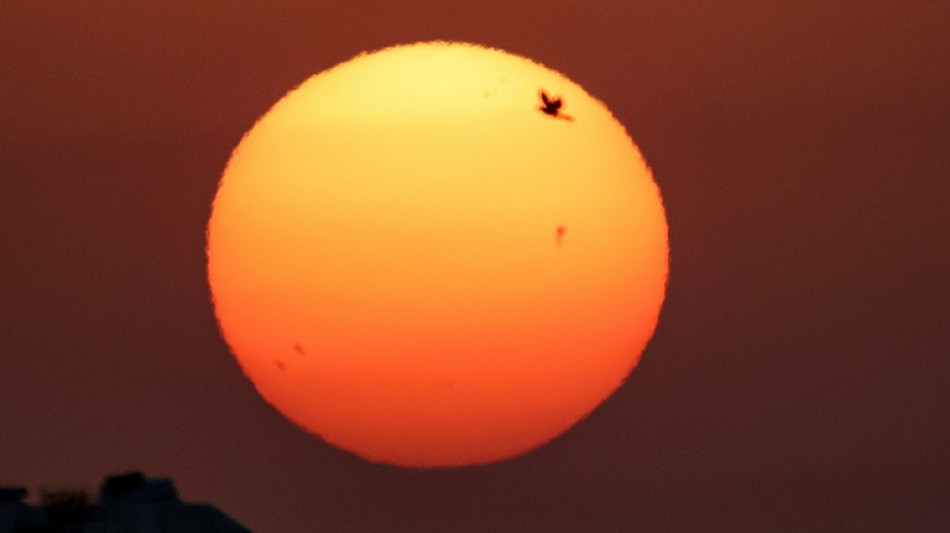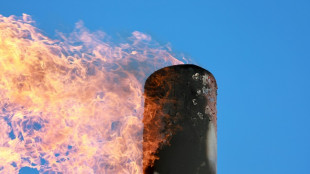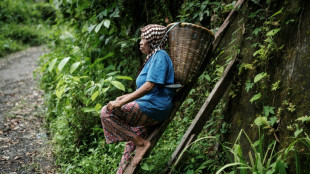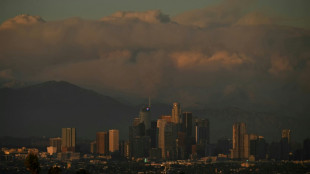
-
 Putin evokes WWII victory to rally Russia behind Ukraine offensive
Putin evokes WWII victory to rally Russia behind Ukraine offensive
-
China exports beat forecasts ahead of US tariff talks

-
 Leo XIV, the 'Latin Yankee', to celebrate first mass as pope
Leo XIV, the 'Latin Yankee', to celebrate first mass as pope
-
Most stocks lifted by hopes for US-China talks after UK deal

-
 IPL suspended indefinitely over India-Pakistan conflict: reports
IPL suspended indefinitely over India-Pakistan conflict: reports
-
German lender Commerzbank's profits jump as it fends off UniCredit

-
 Rare bone-eroding disease ruining lives in Kenya's poorest county
Rare bone-eroding disease ruining lives in Kenya's poorest county
-
India says repulsed fresh Pakistan attacks as de-escalation efforts grow

-
 Zhao's historic snooker title sparks talk of China world domination
Zhao's historic snooker title sparks talk of China world domination
-
'High expectations': EU looks to Merz for boost in tough times

-
 Poisoned guests rarely invited before deadly mushroom lunch, Australia trial hears
Poisoned guests rarely invited before deadly mushroom lunch, Australia trial hears
-
China sales to US slump even as exports beat forecasts

-
 Indian cricket to make 'final decision' on IPL over Pakistan conflict
Indian cricket to make 'final decision' on IPL over Pakistan conflict
-
Dethroned Bundesliga champions Leverkusen face uncertain future

-
 China can play hardball at looming trade talks with US: analysts
China can play hardball at looming trade talks with US: analysts
-
French monuments in trouble while PSG prepare for Champions League final

-
 Newcastle face Chelsea in top five showdown, Alexander-Arnold in spotlight
Newcastle face Chelsea in top five showdown, Alexander-Arnold in spotlight
-
Flick's Barca must show 'hunger' in crunch Liga Clasico

-
 Clasico the last chance saloon for Ancelotti's Real Madrid
Clasico the last chance saloon for Ancelotti's Real Madrid
-
Timberwolves overpower Warriors to level series

-
 Chinese fabric exporters anxious for US trade patch-up
Chinese fabric exporters anxious for US trade patch-up
-
Putin gears up to host world leaders at lavish army parade

-
 Nearing 100, Malaysian ex-PM Mahathir blasts 'old world' Trump
Nearing 100, Malaysian ex-PM Mahathir blasts 'old world' Trump
-
Leo XIV, first US pope, to celebrate first mass as pontiff

-
 Asian stocks lifted by hopes for US-China talks after UK deal
Asian stocks lifted by hopes for US-China talks after UK deal
-
Former head of crypto platform Celsius sentenced 12 years

-
 Ex-model testifies in NY court that Weinstein assaulted her at 16
Ex-model testifies in NY court that Weinstein assaulted her at 16
-
Nestlé and OMP Showcase Approach to Future-Ready Supply Chain at Gartner Supply Chain Symposium/Xpo in Barcelona

-
 Genflow Biosciences PLC Announces Share Subscription, Director's Dealing and Update
Genflow Biosciences PLC Announces Share Subscription, Director's Dealing and Update
-
Argo Blockchain PLC Announces 2024 Annual Results and Restoration of Listing

-
 'Great honor': world leaders welcome first US pope
'Great honor': world leaders welcome first US pope
-
Pacquiao to un-retire and fight Barrios for welterweight title: report

-
 Trump unveils UK trade deal, first since tariff blitz
Trump unveils UK trade deal, first since tariff blitz
-
Man Utd one step away from Europa League glory despite horror season

-
 Jeeno shines on greens to grab LPGA lead at Liberty National
Jeeno shines on greens to grab LPGA lead at Liberty National
-
Mitchell fires PGA career-low 61 to grab Truist lead

-
 AI tool uses selfies to predict biological age and cancer survival
AI tool uses selfies to predict biological age and cancer survival
-
Extremely online new pope unafraid to talk politics

-
 Postecoglou hits back as Spurs reach Europa League final
Postecoglou hits back as Spurs reach Europa League final
-
Chelsea ease into Conference League final against Betis

-
 Pope Leo XIV: Soft-spoken American spent decades amid poor in Peru
Pope Leo XIV: Soft-spoken American spent decades amid poor in Peru
-
First US pope shared articles critical of Trump, Vance

-
 'Inexcusable' - NBA champs Boston in trouble after letting big leads slip
'Inexcusable' - NBA champs Boston in trouble after letting big leads slip
-
US automakers blast Trump's UK trade deal

-
 Stocks mostly rise as US-UK unveil trade deal
Stocks mostly rise as US-UK unveil trade deal
-
Trump presses Russia for unconditional 30-day Ukraine ceasefire

-
 Anything but Europa League glory 'means nothing' for Man Utd: Amorim
Anything but Europa League glory 'means nothing' for Man Utd: Amorim
-
'Inexcuseable' - NBA champs Boston in trouble after letting big leads slip

-
 Pope Leo 'fell in love with Peru'and ceviche: Peru bishop
Pope Leo 'fell in love with Peru'and ceviche: Peru bishop
-
Pakistan's T20 cricket league moved to UAE over India conflict


Kuwait's scorching summers a warning for heating planet
As the blazing summer sun beats down on Kuwait, shoppers stroll down a promenade lined with palm trees and European-style boutiques, all without breaking a sweat.
In one of the world's hottest desert countries, it's all made possible by architecture and technology: the entire street is located inside the heavily air-conditioned Kuwait City shopping mall.
Outside, where temperatures now often soar around 50 degrees Celsius (120 degrees Fahrenheit), barely anyone is moving around on foot, leaving the historic market largely deserted.
"Only a few people stay in Kuwait at this time of year," said date merchant Abdullah Ashkanani, 53, as large fans sprayed cooling mist onto the few customers braving the blistering heat.
Ashkanani, who hails from Iran, said he keeps his shop open largely "for appearances" during the hottest months when most of Kuwait's four million residents flee abroad.
For those who stay behind in the tiny oil-rich country, life is made bearable by the ever-present Arctic blast of air-con systems.
"We can put up with it because the house, the car, everything is air-conditioned," said pensioner Abou Mohammad, dressed in a white robe and keffiyeh and sitting in a comfortably cooled cafe.
The irony is not lost on him that such energy-guzzling systems produce the carbon emissions that are heating up the planet -- especially the sweltering Gulf region, a climate hotspot.
Such excessive energy consumption, said Mohammad, has "brought this heat to Kuwait".
- Heating up -
Kuwait is home to seven percent of the world's crude reserves -- energy wealth that has long afforded many of its people a luxury lifestyle.
An extremely water-scarce country, it also relies heavily on fossil fuels to power seawater desalination plants.
Like Saudi Arabia and Qatar, Kuwait is one of the world's leading emitters per capita of CO2, a key driver of global warming.
Kuwait has always been hot, its dry summers fanned by the northwesterly shamal wind that also blows over Iraq and Saudi Arabia.
Temperatures in Mitribah, a remote area in northwest Kuwait, often soar past 50 degrees Celsius, making it one of the hottest places on Earth after Death Valley in eastern California.
But in recent years, climate change has made summer peaks hotter and longer, said meteorologist Essa Ramadan, as periods of extreme heat have gone "from two weeks to about a month".
The number of days per year that see temperatures rise above 50C have more than tripled since the turn of the century, noted the meteorologist.
As the world records ever more heat records, "what is happening to us will happen elsewhere", he warned.
- Grassroots -
Kuwait -- where glass towers soar into the sky and cars choke the highways -- has only recently invested in public transport and green energy to help counter climate change.
Its environment protection authority, which falls under the oil ministry, recognises "a rise in temperatures in recent years", its director Samira Al-Kandari said.
To help change course, Kuwait has started building its first commercial solar power park, the Shagaya project.
With the first phase complete, and other projects planned, Kandari said Kuwait's goal is that "renewable energy constitutes 15 percent of our energy production by 2035".
"We will increase this percentage in the future," she said.
Outside of the state institutions, some Kuwaiti citizens have launched grassroot initiatives, including tree-planting to help cool sun-baked urban environments.
Essa Al-Essa, a 46-year-old dentist, started planting trees as a "hobby" in a vacant, sandy lot near his home on the outskirts of the capital, he told AFP.
In 2020, at the height of the Covid pandemic, he developed it into the Kuwait Forest project, starting a green space that also helps scrub the air and captures carbon.
"Trees are particularly useful in polluted places such as industrial and residential areas," said Essa.
But he also hopes the natural shade and cooling they provide will help break the dominance of energy-intensive air-conditioning.
"The more we cool our houses," Essa said, "the more we warm our surroundings."
J.Williams--AMWN


